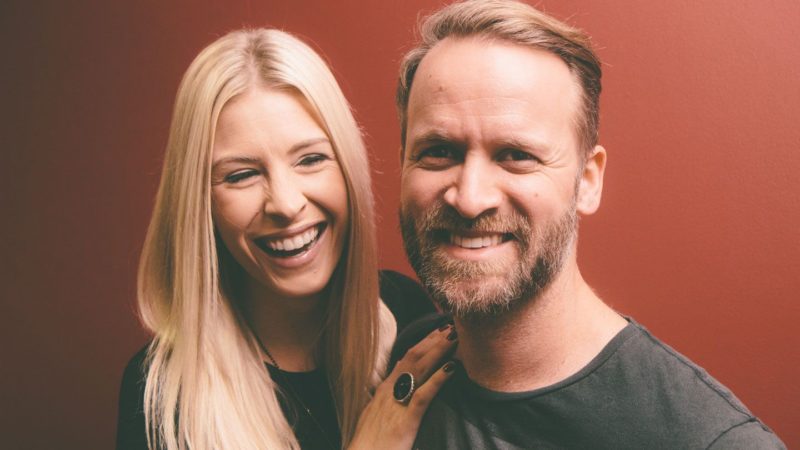Brian Johnson remembers when the panic attack hit. On the outside, the Bethel Music and WorshipU cofounder, author of the book When God Becomes Real, husband and father seemed to have it all together. But two years ago, something happened inside of him. Suddenly, in a rush of anxiety and panic, he lost control.
“Can’t breathe. Can’t think straight. That’s a scary one when your mind is not working. That’s pretty paralyzing,” he remembers. “The sense of hopelessness was so strong that you just can’t reason it away. It’s all consuming, overtaking, and I’ll tell you the word hell becomes very real.”
After a few days in the hospital, Johnson went home, but not long later it happened again. But this time, it was in the form of a nervous breakdown that took a toll on him for months.
Johnson, like his wife, Jenn Johnson and father Bill Johnson—the founder of the influential Bethel Church—believes deeply in the power of the supernatural, healing and God. In fact, the church regularly conducts “healing services” where congregants pray that God will cure people’s diseases. He believes that “spiritual attacks” are real. He believes supernatural healing is possible.
But, his experiences with panic led him to a path to healing and recovery that more and more churches are beginning to embrace. Mental health, anxiety and depression aren’t spiritual afflictions. They’re also physiological. And “healing” can involve a lot more than prayer.
During the season of extreme anxiety when Johnson was having a prolonged nervous breakdown, he did what he’d always had done. He turned to God for help.
“When I was a kid, worship is what got me through panic attacks and those different things,” he says. “But in the nervous breakdown and that whole season, reading the Bible, getting up and reading the word over and over is what helped my mind heal.”
He also wants people to be clear on something else: something that more and more churches are now beginning to realize. Part of God’s ability to heal mental health issues looks different than spiritual exercises.
“I want to make sure to highlight, I did take medication,” he says.

He emphasizes that “removing the shame and giving grace for periods of time for people to see a doctor” is important — especially in churches that simply try to “pray away” mental and emotional health issues like anxiety.
“It’s the same thing in my mind if you had a broken arm and didn’t fix it. It’d be cruel,” he says. “And I think for me, it was physical for a time, and I needed that medicine for a season. The doctor even told me that.”
Johnson isn’t alone. A study from the Centers for Disease and Control found that 31 percent of Americans were suffering from new bouts of anxiety and depression brought on by the COVID-19 pandemic. This is hitting young people particularly hard, with a full quarter of Americans between the ages of 18 and 24 saying they’d contemplated suicide because of the pandemic.
Rhett Smith, author of The Anxious Christian and a Licensed Marriage and Family Therapist, says that many Christians have some major misconceptions when it comes to anxiety and mental health.
“Paul says in Philippians 4:6 ‘don’t be anxious,’ and they take that at face value,” he explains. “I think a huge misconception for Christians is they feel like something is wrong with them or something is wrong with their faith or they must be a bad christian if they’re experiencing anxiety.”
When that happens, for many people, the most obvious thing to do is to turn to a faith leader for help. The problem is, many simply aren’t qualified to treat actual, clinical issues.
“I have lots of people in my therapy practice who come in and say, ‘I’m anxious, and I tried to go talk to my pastor or my friend or someone in my community, and they just said I should just pray more and not be anxious,’” he explains. Not only is that simply not good advice, it stems from a misreading of what Paul was actually saying. Smith says: “That type of anxiety is used to express care or concern for people.”
And, treating actual anxiety with one-size-fits-all solutions ignores what we now understand through science and medicine to be the causes of anxiety and different mental health conditions.
“One of the dangers is that we forget the idea that God has put us in human bodies and we’re all wired differently, and we all have different brain circuitry, and we all had different experiences growing up, and some of us have faced a lot of trauma that has wired us,” he says. “I think we just forget that we are not simply spiritual beings, we’re human beings with flesh and blood, and because of that, anxiety is not simply a spiritual issue.”
When well-meaning pastors or church leaders meet with people suffering from anxiety, but aren’t qualified or trained in actual treatment, it can make the problem worse. Pushing for strictly spiritual solutions to extremely complex problems can lead to people not getting the answers or the help they need.
“We know so much more about the brain than even we did five years ago,” Smith explains. “We know we can scan a brain with an F-MRI scan and look at the neural networks and look at the chemicals going through the brain, and we can realize that there was so much more happening that is beyond us and beyond our beliefs of what we think about spiritually.”
He also says that this approach is clearly scriptural: “God gives us discernment as Christians about decisions we make, and part of the discernment we have as believers is to look around and take the advice and the wisdom of people who’ve done a lot of research on the body and studied the body.”

Rebekah Lyons remembers what it feels like when “anxiety comes knocking all the time.” Happily married with three kids, she’s a successful writer (her latest is called Rhythms of Renewal: Trading Stress and Anxiety for a Life of Peace and Purpose). Her and her husband Gabe also founded the successful Q Ideas conference. Outwardly, her personal and professional lives were going terrific. On the inside, she was consumed with stress and anxiety.
One day, in a moment of more intense anxiety, she realized that she needed to make serious changes in her day-to-day life.
“The American Institute for Stress says that 77 percent of our society right now feels the physical symptoms of stress on a daily basis,” she explains.
Though her emotional health journey looks different from Johnson’s, she too took a strategy that was more than just “pray it away,” though she does pray daily. So, she came up with a plan.
“I was like, ‘I need to make this practical, actionable, approachable, where we can somehow with God take charge of our emotional health and inspire some of our loved ones to do the same.’”
Today, she builds in practices—like times of rest, removing certain social media from her phone, being intentional about family time and recreation—that helps on a daily basis.
“Just being open about this tends to take away some of its power,” Smith says. “Just the ability to acknowledge it I think diminishes some of the power that it has.”
She, like Johnson — and what Smith hopes are many other church leaders — is learning that though God can “heal” anxiety and emotional issues, He often does it in ways that might not seem as “spiritual” as many Christians were taught.
Most importantly, more Christians are finally opening up about mental and emotional health. There is no shame in seeking the lives God intends for us, through all the resources He’s made available.













